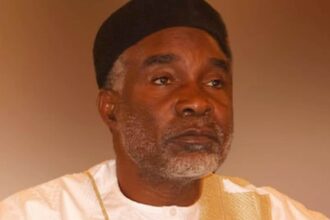...To get all news updates, Join our WhatsApp Group (Click Here)
Also Join our WhatsApp Channel (Click Here)
As the Unity Bank Plc situation drags on, with board members losing patience, E-Nigeria Newspaper has learned that former President Olusegun Obasanjo has stepped in to save the bank’s MD/CEO, Tomi Somefun. Somefun, a pastor with the Redeemed Christian Church of God (RCCG), is claimed to be inept and allegedly hires consultants to handle most of her work at the bank.
Inside sources told E-Nigeria that the bank’s board of directors had lost faith in Somefun’s leadership after she failed to turn the bank’s fortunes around. “The former President has continued to be Somefun’s saving grace throughout the years, and yet again he interfered, pacifying with the board to keep her job,” a bank insider told this newspaper. Obasanjo is believed to have pleaded with the bank’s board of directors to extend Mrs. Tomi Somefun’s delivery time. “Mrs. Somefun should have been fired, especially because she has done very little since taking office, and I can tell you that the bank had given up on her ability to deliver and was about to take drastic action against her if it hadn’t been for Baba Obasanjo’s timely intervention,” the source added. Unity Bank Plc is owned by ex-President Olusegun Obasanjo and General Ibrahim Babangida (IBB).
While IBB’s son, Aminu, is the lender’s chairman, Obasanjo’s daughter, Oluwafunsho, is a Non-Executive Director on the board. A detailed examination of Unity Bank’s records reveals that the lender is in desperate need of capitalization if it is to survive the CBN’s hammer. In a previous report, E-Nigeria Newspaper revealed that the bank’s external auditor, KPMG Professional Services, raised a red flag about Unity Bank’s existence in 2019 and 2020, stating that the lender’s total liabilities exceeded its total assets by N279 billion and that the lender failed to meet the required minimum CAR of 10% for a national bank. “A material uncertainty exists that may put significant doubt on the bank’s capacity to continue as a going concern,” according to KPMG. The bank was also given a “BB-” rating by Agusto & Co., indicating that it is junk, or below investment grade.
The board, on the other hand, has expressed tremendous confidence in its ability to save the financial institution and get it back on its feet. The auditor issued a new warning regarding this ongoing issue and the results in the 2020 reporting year. Unity Bank only had a pre-tax profit of N2.1 billion in the year, compared to N3.4 billion in 2019, and its total liabilities exceeded its total assets by N275 billion compared to N279 billion in 2019, with a CAR of -101.29 percent compared to -200.8 percent in 2019. “As a result, the bank failed to meet the CBN’s minimum capital requirement and the CAR, which is 10% for a bank with a national banking license. The board of directors acknowledges that the timeframe of the bank’s recapitalization remains unknown. “However, in the capital mobilization for the bank, the directors have proceeded to an advanced stage with both local and foreign investors,” the results stated. The financial institution’s performance trend has scarcely delighted investors in the last five years, and there have been patches of weakness here and there, signaling that everything is not right with the bank. For instance, its profit before tax slumped 82 per cent from N13.639 billion in 2014 to N2.342 billion in 2015. It also dropped by 22 per cent from N2.342 billion in 2015 to N1.816 billion in 2016. In 2017, the bank had a loss before tax of N14.243 billion compared with the pre-tax profit of N1.816 billion in 2016 and in 2018, in its restated results, the bank recorded a loss before tax of N7.554 billion, but in 2019, it was a pre-tax profit of N3.642 billion and in 2020, it slumped to N2.223 billion.
The report of the independent auditors for Unity Bank, KPMG Professional Services, showed that as at December 31, 2020, the total liabilities of the bank “exceeded its total assets by N275 billion and the bank did not meet the required minimum Capital Adequacy Ratio (CAR) of 10 per cent and the minimum capital requirement of N10 billion for a national bank as required by the Central Bank of Nigeria (CBN).” From the analysis of the results, the total assets of the lender stood at N492.0 billion in the period under review, while the total assets stood at N767.4 billion, with the CAR at -101.29 per cent. These indicators are worrying. Earnings per share fell 38 per cent to 17.8 kobo per share from 28.9 kobo per share the previous year. Personnel expenses rose by 10 per cent to N10.4 billion compared to N9.4 billion in 2019, while depreciation of property and equipment dropped to N1.69 billion compared to N1.7 billion in the same period of 2019. The bank paid N22.1 billion income tax in 2020, a 38 per cent decline compared to N 36.2 billion paid the year before. There are concerns among shareholders of the lender that there may not be time to achieve these lofty goals as last year, the bank had to receive a N50 billion short term loan from the CBN to meet working capital requirements and this credit facility is expected to mature on September 19, 2021. This loan and others have increased the debt of the financial institution. A critical look at the financial statements in 2020 showed that Unity Bank is no longer enjoying the patronage of individual and government depositors, except for corporate depositors.
Last year, the deposits from the government reduced to N27.1 billion from N30.9 billion, while the deposits from individuals dropped to N99.1 billion from N123.0 billion. Only deposits from corporate organizations rose to N230.4 billion from N103.8 billion and this contributed to the increase in the customer deposits of Unity Bank in the year to N356.6 billion from N257.7 billion in 2019.
In the year, Unity Bank said its profit before tax dropped to N2.2 billion from N3.6 billion, while the profit after tax went down to N2.1 billion from N3.4 billion.
Source: E-Nigeria.com
You can get every of our news as soon as they drop on WhatsApp ...To get all news updates, Join our WhatsApp Group (Click Here)
Also Join our WhatsApp Channel (Click Here)












